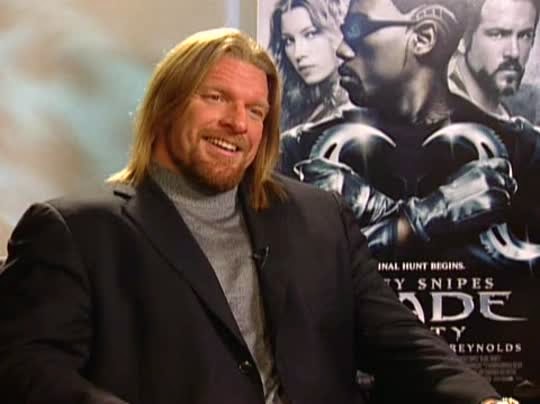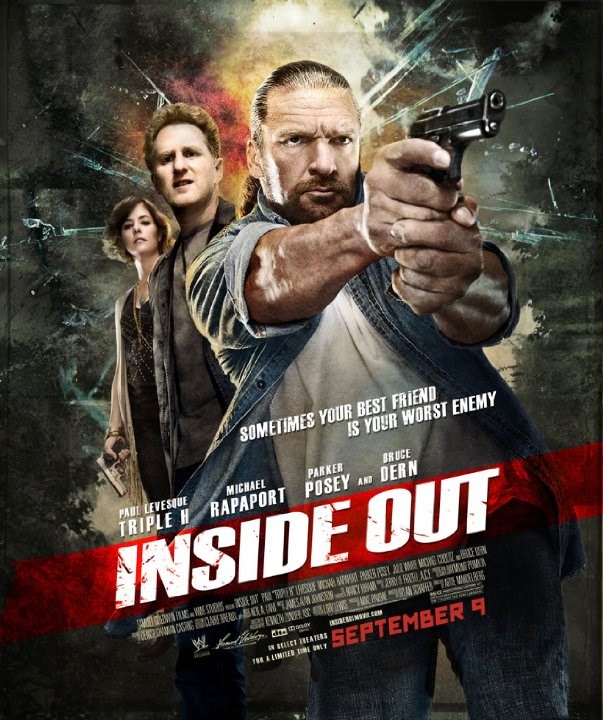We can't ignore that wrestlers need time off. The laws of man might not apply to the gods of the squared circle, but the men who portray those deities are human beings. The schedule as it stands is grueling, borderline inhumane, and largely unnecessary. It's institutional, sure, but institutions evolve. The athletes beat themselves to a pulp, bouncing off the mat (and the ringside floor) four nights a week. As WWE constantly searches for mainstream attention, the tragedies that characterized the popular representation of wrestling through much of the past 10 years have demonstrated the need for better treatment of wrestlers' bodies. The masochistic and itinerant lifestyle of wrestlers, exacerbated by the excesses of the '80s and '90s, led to widespread drug abuse: You pop pills to dull the pain, you snort cocaine to bring you back up, and you drink 20 beers to put yourself to sleep. It all starts with the painkillers. Thankfully, the majority of current wrestlers were fans themselves and saw this cycle play out either on the news or with their own eyes. And in some ways, the WWE is doing more than ever before. It takes concussions seriously; it provides rehab for wrestlers with substance-abuse problems (even for its former employees); it pays for many surgeries and allows reasonable recovery time. (In years past, injured wrestlers were discarded by shallow-pocketed territorial outfits, and as recently as 1998 one major company fired a hobbled performer via FedEx while he lay in his hospital bed.) Even so, wrestlers hardly get a week off unless they're filming movies (often for WWE Films) or when they're injured. Which sort of defeats the point.
But a literal offseason remains impossible. WWE is too dependent on the steady stream of television and house-show revenue to alter its schedule. The networks count on WWE for steady content and the fans have been conditioned to expect never-ending product. That shouldn't be the end of the conversation, however. It can't be. Wrestling isn't a traditional sport, and it probably doesn't need a traditional offseason. And in the interest of the pseudo reality that wrestling has always tried to convey, it must be said that an offseason isn't, well, realistic in a world where athletic endeavor is characterized as much by personal animosity as by competition. But being that a deeper reality — that of wrestlers' humanity and health — runs as a discomforting undercurrent through the sport's onscreen unreality, it's crazy to regard the current system with a shrug. If the concussion epidemic is causing people to wonder whether the NFL can continue to exist, shouldn't a larger-scale conversation be allowed for the wrestling world? WWE can't promote the "real athleticism" of wrestlers, run "Don't try this at home" commercials, and then hide behind wrestling's falsehood when it comes to the health of the performers. So, here is a modest proposal from this lowly quarter: a staggered offseason in the form of mandatory sabbaticals every year for every wrestler. How does this sound?
A mandatory three months off every year for every wrestler. (For the record, I could easily argue for four and I'd settle for two.)
This time off — I'll just call them sabbaticals — is staggered and coordinated in advance so WWE is never left starless or otherwise short-handed.
Wrestlers can still be on TV while they're on sabbatical, in interviews or other pretaped segments. Think John Cena's recent rehab video, or the kind of serial promo videos once used to repackage characters.
In moments of great need, wrestlers can be called back into duty during their sabbaticals, but it can be mutually agreed that they will appear under these circumstances: (1) for promos and other non-wrestling purposes, (2) for a one-off PPV match, or (3) during the buildup to such a match. Under any of these situations, the time they're called back into duty will be added onto the end of their sabbatical, and under no circumstances are wrestlers required to travel to or wrestle at house shows.
Obviously, WrestleMania (and, to a lesser extent, SummerSlam and the Royal Rumble) will upend the calendar to some extent; the likeliest fix is just to not have sabbaticals between January and March; another option would be to plan so the big names don't have sabbaticals during those months, and if a guy who was previously scheduled to have that time off rises in status unexpectedly during the course of the year, they can reschedule his sabbatical. (Another would just be to bring guys back for a few shows leading up to 'Mania, basically putting them on the same schedule the Rock's been on the past couple years.)
If wrestlers suffer an injury during their regular schedule and that keeps them off TV for a significant amount of time, that time can be reduced from their sabbatical, but only if they are sent home during recuperation. Think in terms of formally putting a player on the IR/DL in pro sports.
During the sabbatical, unless wrestlers are nursing a legitimate injury, they are required to spend two weeks at the Performance Center in Orlando working with developmental talent.
If certain wrestlers (I'm looking at you, John Cena) are so driven to succeed in the game that they feel unable to take time off, WWE should partner up with the NBA or NFL and set up a mentoring program so that real pro athletes can show wrestlers how to appreciate a few months off. I'm only half-joking here; LeBron spends summers making his game better in ways that are impossible during the regular season. Couldn't Cena be doing that?
I know what you're thinking. There are a million objections, a million reasons this won't work. Let me try to address some of those points now:
Sure, that sounds great, but I want to see CM Punk every week — or John Cena, or Daniel Bryan.
The hope would be that minus the gravity of such supernovas, there would be space for other stars to develop. On the one hand, that's wishful thinking, but on the other hand, it's logic abetted by history — wrestling has been around for a century, and there have always been heroes and villains and there always will be. So many stars of the Attitude Era, that glorious moment in modern pro wrestling — "Stone Cold" Steve Austin and Shawn Michaels and Mick Foley — got the opportunity to shine only because of the lack of talent in the WWF. The biggest handicap the WWE has had over the past several years is that Cena's been there consistently, being plugged into shows and story lines and matches where he doesn't belong just for the sake of boosting ratings. Good for him for being willing, but bad on WWE for using him as a crutch. That's not window dressing, it's addiction.
It's not as if a part-time schedule prevents current fans from cheering Chris Jericho or Brock Lesnar or the Rock every time they return; nor does WWE seem reluctant to hype them as major stars despite their lack of full-time commitment. If anything, it's the opposite: Fans go crazy when Jericho or Brock comes back. There's no easier or more effective a story line than the shocking or triumphant return of a major star. It's not just the stars — how many lesser lights have returned from injury layoffs to loud reactions and an increased position on the food chain?
Sure, but WWE is paying them salaries based on 12 months of work.
A couple of things to note here: As far as business goes, having guys off the air a few months a year may well be beneficial — their return matches are going to be bigger, and the product will feel fresher. They'll be more emotionally and physically healthy, which will likely prolong careers and keep them making money longer. All that aside, WWE is about to renegotiate its TV contract and will undoubtedly be making hundreds of millions more dollars than it was before, so it can afford it. Will it have to hire more wrestlers? Probably.3 Will it have to moderate salaries it doles out in the future to accommodate this? Well, it obviously doesn't have to, but it can — that's part of running a business. There's no strong argument for reducing salaries across the board. In other "professional sports" that sort of thing is dictated by players unions and impartial mediators — neither of which WWE has, and presumably neither of which it has any interest in. As much as it has improved in the past several years in the way it treats its current and former talent — in actually becoming a case study in responsible capitalism — it'll have to swallow this kind of thing from time to time to keep the ship steered straight.
Sure, but the wrestlers won't like it. They'll feel like they're missing opportunities for better positions and losing merchandise sales that they need along with their salaries.
These concerns will undoubtedly be voiced, and they're both overblown. Wrestlers will have even better opportunities to stand out when they're not on sabbatical because big stars will be taking time off and leaving room at the top. As to merch sales, my guess is the losses will be minimal. The event-specific T-shirts — like the "Best vs. the Beast" shirts that were sold at SummerSlam this year — would take a hit, but only if the Best or the Beast were on sabbatical, so that's sort of moot; their shirts will be back on sale as soon as they return. General sales probably won't be affected. As I have pointed out, it's only three months, and I've seen enough kids buying Zack Ryder hair hats at shows when he wasn't even in the building to know that people will buy a wrestler's swag even if he's taking the night off.
Sure, but this is an industry based in tradition. It's not going to adapt to something this different.
To a large extent, I agree with this. A quick, related aside: When I talked to Bradley Safalow a couple weeks ago, one question that he brought up was whether WWE would move away from house shows altogether as the profits from those events become a smaller and smaller percentage of its annual revenue. It's a good question — and if the answer is yes, the necessity of sabbaticals would obviously drop significantly. But I don't see house shows disappearing. For one thing, they're such an intrinsic part of the business that wrestling wouldn't be the same without them. Functionally, house shows serve many purposes: testing angles and gimmicks, letting wrestlers practice matches away from the spotlight so that the TV product looks more refined, and keeping fans engaged with the product on a near-personal basis. Wrestling is a sport of crowd participation, and to lose that nightly element of the product would be detrimental. But I could see them going from four nights a week to three or two.
Tradition will probably be even harder to overcome in this offseason system. But the WWE model is not the only way wrestling ever existed. In a lot of ways, the sabbatical system is how the industry was functionally structured in the Territorial Era. Wrestlers would appear for six or 12 months and disappear to go someplace else. The sabbatical system could function in a similar way. Imagine a WWE where you never knew who was going to be on the show. Imagine how much more you'd love Punk if you only got nine months of him a year — and how much more you'd enjoy Raw without those three months of Cena. (Errr, for example.) Imagine the "Loser Leaves Town" matches! In an era when wrestlers were actually independent contractors, when they actually had the power that comes with free agency, time off was a much more feasible concept. Sure, you didn't have a major corporation footing your medical bills, but you also didn't risk lifetime unemployment if you decided to skip town and go to Hawaii for a week. I'm not saying that's the most professional way to live your life, but at the bottom of it all, this is partly an issue about wrestlers regaining volition. The time off is time for them.
Sure, but how can a company that let the Summer of Punk drag out for only a few weeks be expected to stick to this schedule?
In the end, this is probably the biggest problem with sabbaticals. I have complete faith that WWE's writers would adjust easily enough, being that they so regularly deal with unplanned injuries. The greater problem is teaching the higher-ups to resist calling in Cena from his poolside hammock (or out of his Mandarin class) when ratings take a dip. There will be moments when Vince McMahon flips out because he can't book angles on the fly because the wrestler he wants is on sabbatical. Some of this is unavoidable, but two things would help: (1) having somebody high up in the power structure (I'm looking at you, Triple H) who is unwaveringly behind the plan, and (2) the WWE giving sabbaticals a huge public-relations push, forcing itself to abide by the plan or face public condemnation.
The important thing here is that this isn't some do-gooder plan that will burden the product. This should be an incredibly good thing for the product. Cody Rhodes recently took off a couple weeks for his honeymoon and it ended up making us realize how much we cared about him. What happened next? WWE elevated him to the main event. John Cena took a couple months off to have arm surgery, and his rehab videos might be the most compelling televised WWE content right now. Lesnar, Punk, Jericho, Undertaker, Heyman, even the Bella twins — all of them have, to various degrees, been made by the time they've spent away from the sport and/or out of the spotlight. Don't think of it in terms of guys leaving, think of it in terms of them coming back.
The physical toll that wrestling takes on its heroes is significant, and that can never be eliminated. But sabbaticals could help. Just think about all the pro athletes who get hurt and say they won't be able to get totally healed until the offseason and then limp through the playoffs, shadows of their normal selves. The mental toll is also significant. CM Punk is already talking about retiring next year — next year — because he's so worn down and burned out. Little wonder: His walkabout in the summer of 2011 was incredibly brief, and his post-Mania time off this year — rumored to be a few months — ended up being a matter of weeks. Wouldn't you rather see him nine months a year than not at all?
My guess is that a significant portion of the WWE audience watched Cain Velasquez and Junior Dos Santos brawl at UFC 166, and it doesn't take a genius to realize that the most powerful tool of the UFC hype machine is the fact that we see these guys only a couple times a year. If you missed Saturday, you missed one of the only Cain Velasquez moments of your life. This is how sports can tease consumers (in a good way), and pro wrestling — partly because it's fake, but also by its own choice — neglects to make its fans wait for anything. The announcers scream as if every PPV is the biggest yet, but their bluster betrays the reality that every card is about 75 percent the same as the last one.
That has to change, obviously. So does the lack of an offseason. Give the guys some time off, whether they want it or not. Maybe this idea still has holes, and maybe somebody else has a better solution. But let's have this conversation.
source: grantland.com

Longest Running Triple H Fansite
Since 2006
Since 2006














0 comments:
Post a Comment
Your comment awaits moderator approval. Comments that are abusive, spam, off-topic, use excessive foul language, or include ad hominem attacks will be deleted.